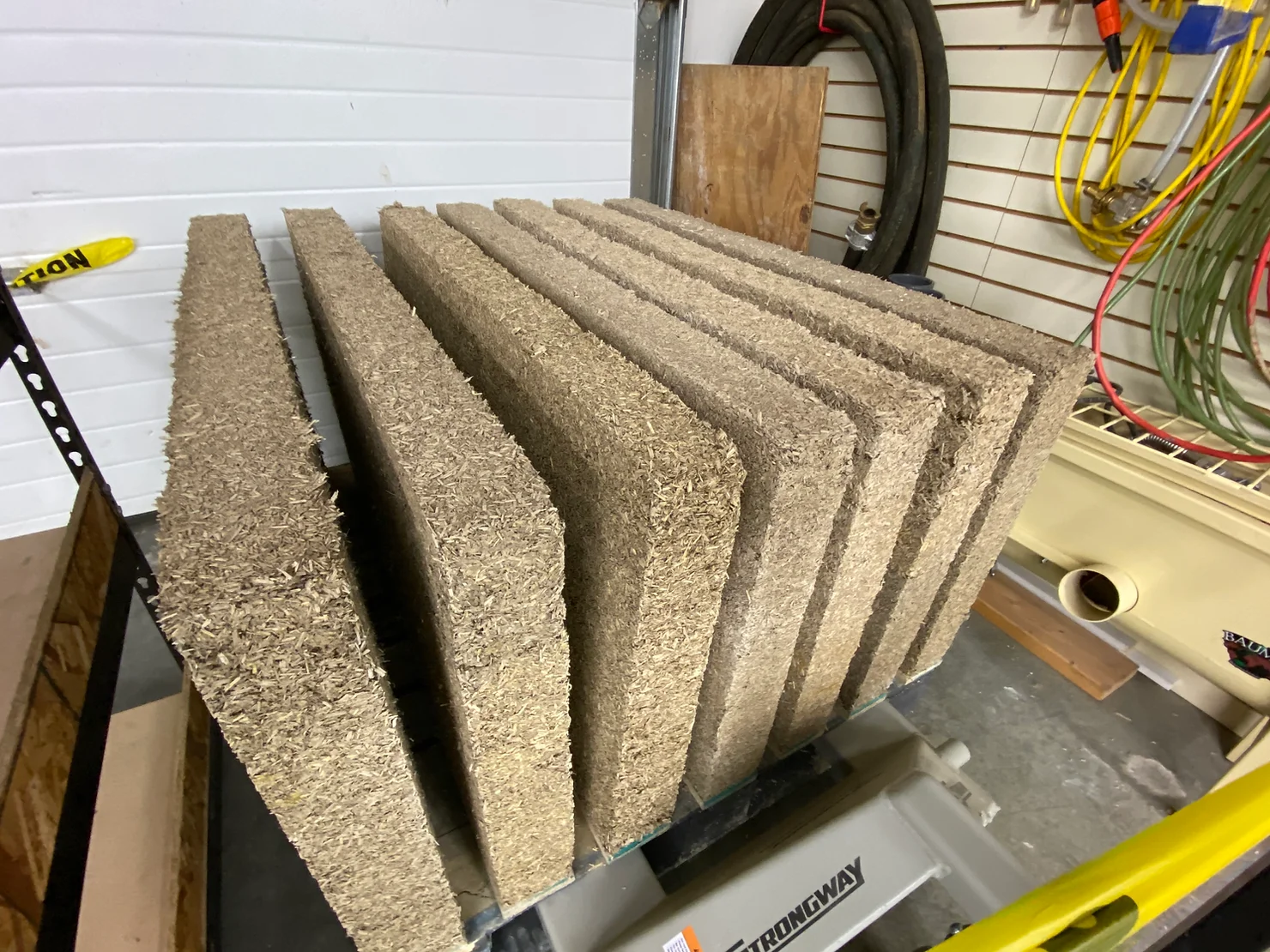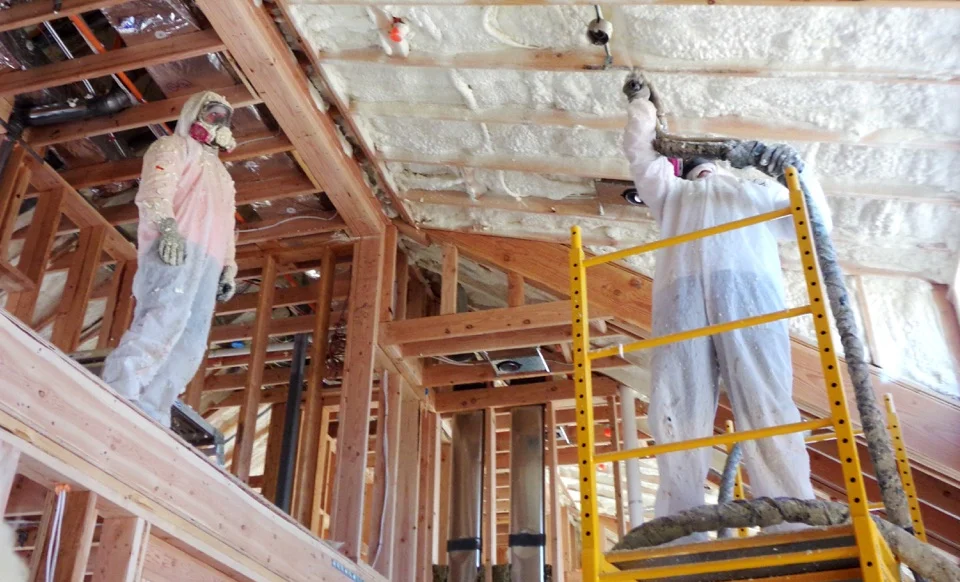Updated: Oct 21, 2022
Home insulation comes in many different varieties, with fiberglass and mineral wool being two of the most popular. Both of these materials have pros and cons and they are both produced in unique ways.
They are both common insulation choices for homebuilders, so you might be wondering what the best option is.
Let’s take a comprehensive look at how these two materials stack up against each other and what a superior alternative might be.
What is Fiberglass?

To the average person, fiberglass is that soft, itchy pink stuff inside the walls of homes. Professionals know, however, that fiberglass is actually made from literal strands of glass that are blown so thin that they have to be measured in microns.
Glass is superheated and pushed through tiny holes to create thin wisps of glass strands that are then layered over each other and compressed down into thick batts. The glass in fiberglass is actually what makes it so itchy to the touch. There is the possibility it irritates your eyes, nose, mouth, and respiratory system, if exposed in large enough quantities.
Though fiberglass is among the cheapest insulation options, it has some downsides. First, fiberglass isn’t resistant to moisture in the slightest. It will soak up water with ease and stay damp for a long time.
If your fiberglass insulation has a paper backing, it’s possible it could mold when the fiberglass batts get wet. It’s also less resistant to insects than other insulations and sometimes requires a screen to keep them out. Fiberglass has a rather low R-value compared to other types of insulation and this rating goes down when it gets wet or compressed. Fiberglass, in particular, is prone to slumping and creating gaps in insulation.
Fiberglass is not very eco-friendly, either. It’s usually only comprised of about 20% or 30% recycled content. It’s not considered a very good fire block, even though it’s technically considered one. Fiberglass is also subpar at preventing noise transmission. EcoBatt insulation from Knauf is one of the more environmentally friendly types of fiberglass, as it is made in part from recycled glass.
One upside of fiberglass over mineral wool is that it’s lightweight and very easy to install as a result, but you need protective gear as you do not want your skin touching this stuff. In general, however, there’s a reason why fiberglass is the cheapest insulation material.
What is Mineral Wool?

Mineral wool is akin to fiberglass in some ways. It’s produced in a similar fashion, albeit with different materials. While fiberglass is made from blown glass strands, mineral wool is made from blown rock strands. Virgin basalt rock (volcanic rock) is mixed with recycled slag and binders.
This material is then crushed, melted at the temperature of a volcano which requires a lot of energy from coal, coke, or natural gas, and then blown into thin strands just like fiberglass. The strands are layered over each other, fortified with a chemical agent to improve moisture resistance, and compressed into batts for easy installation. Mineral wool is not the most eco-friendly option as recycled variants are made of the slag component, which comes from metal and steel smelting as a waste product left over in the kilns. Slag-based mineral wool also doesn’t perform well compared to a higher basalt rock component.
Mineral wool has a higher R-value/inch than fiberglass, is more dense, and provides superior sound blockage. It also holds a more firm shape than fiberglass. This makes installation of mineral wool even easier than fiberglass, especially in overhead areas where fiberglass would normally flop down as you were trying to secure it to the wall or ceiling.
Mineral wool is water-resistant and will not mold or catch fire. Some of the downsides of mineral wool include the fact that it can be harder to cut than fiberglass during installation, and it isn’t available in very many different sizes. Additionally, mineral wool has a considerable carbon footprint that makes it less attractive for builders and architects looking for sustainable insulation alternatives.
If you’re wondering if mineral wool insulation is better than fiberglass, the answer is yes.
Hemp Insulation is a Better Alternative to Mineral Wool and Fiberglass

While fiberglass and mineral wool are some of the most common options for insulation, they are not the best from an environmental standpoint. If you want sustainable insulation that is vastly superior in just about every category, HempWool® is your best option.
Hemp insulation like Hempitecture HempWool® is made from 90% plant fibers, making it infinitely more eco-friendly than mineral wool or fiberglass. It’s mostly compostable, and repulpable, and doesn’t have any carcinogenic chemicals added to it. Hemp insulation has a comparable R-value compared to both mineral wool and fiberglass. It’s also resistant to moisture, as it is a vapor-permeable insulation.

Hemp comes in panels and batts like most other types of insulation, and cuts similar to mineral wool. It’s also safe to touch and will not irritate you, meaning you don’t need to wear any special gear while installing it.
It has a high level of phase shift resistance (the time it takes for internal temperatures to reach external wall temperatures). This makes it perfect for year-round protection from temperature extremes. Hempitecture HempWool® also provides more noise protection than fiberglass. The STC ratings of HempWool® are currently being evaluated against conventional insulation products.
Neither Fiberglass Nor Mineral Wool Can Compare to Hemp Insulation

When it comes to all the measurable categories that matter, Hempitecture HempWool® outperforms both fiberglass and mineral wool. It’s affordable, easy to install, naturally resistant to moisture, is fire resistant, and resistant to mold. It is one of the most eco-friendly forms of insulation on the market. Additionally, it is the only USDA Biobased Certified Insulation product on the market.
If you want to build a home with insulation meant to last, get it right the first time and contact Hempitecture today to connect with a professional who can answer your questions.



